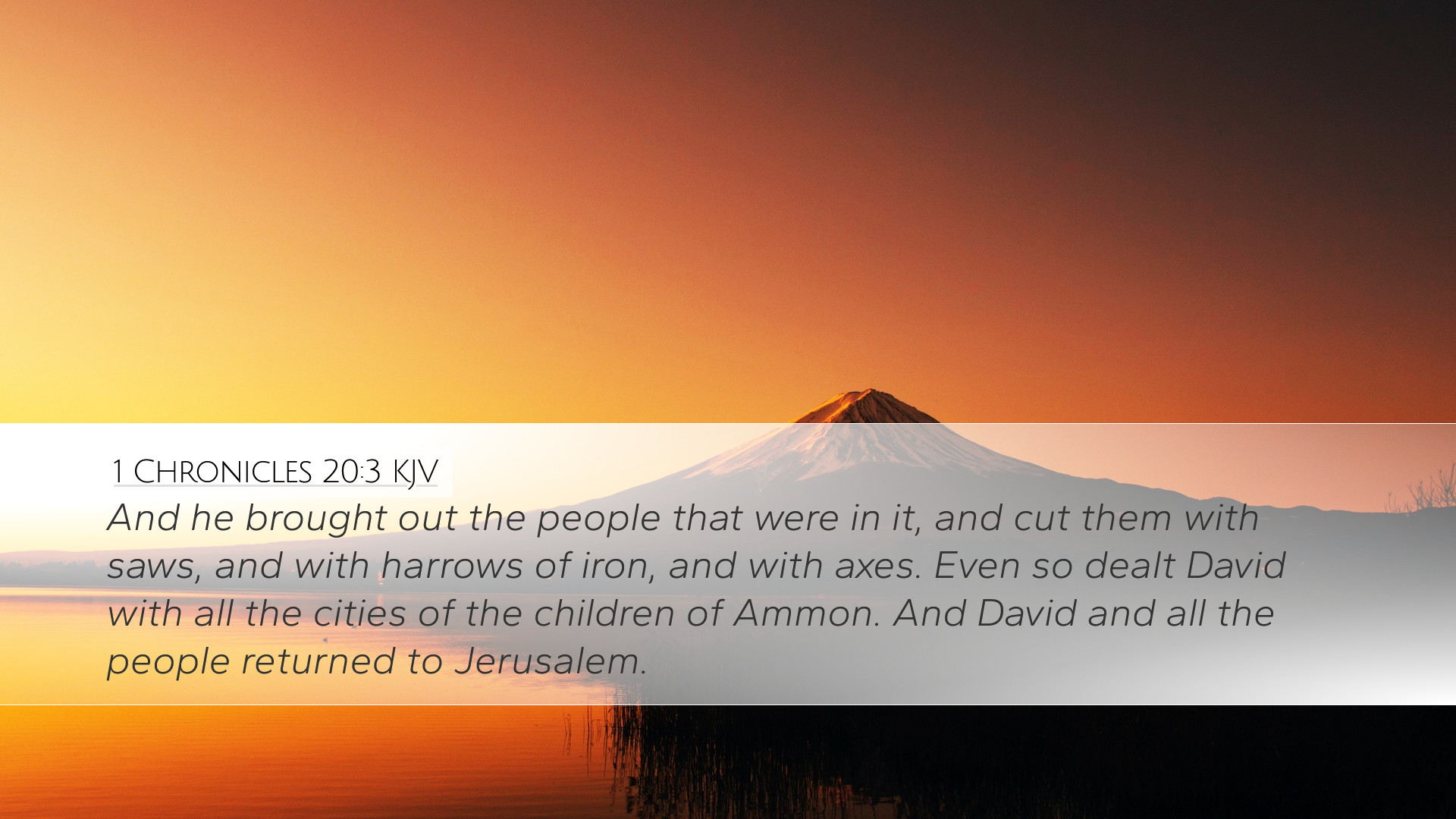Commentary on 1 Chronicles 20:3
1 Chronicles 20:3 states:
"And he brought out the people that were in it, and cut them with saws, and with harrows of iron, and with axes. Even so dealt David with all the cities of the children of Ammon."
Overview
This verse recounts a significant moment in the military conquests of King David, particularly his dealings with the Ammonites after the fall of their capital, Rabbah. It showcases David's might and the severity with which he dealt with his enemies, following the norms of ancient warfare while also revealing theological implications of justice and divine retribution.
Insights from Commentaries
Matthew Henry's Commentary
Historical Context: Matthew Henry emphasizes the historical and theological context of the Ammonite conflict. He notes that the Ammonites, descendants of Lot, had a long history of animosity toward Israel. This verse illustrates the fulfillment of God’s promise to Israel to conquer their enemies, particularly focusing on the struggle against the Ammonites as a reflection of broader spiritual battles.
Divine Retribution: Henry suggests that David's actions symbolize divine retribution—God’s judgment against a nation that had previously treated David’s messengers with contempt. His comment on the severity of David’s dealings indicates that the Ammonites were held accountable for their idolatry and opposition against God’s people.
Albert Barnes' Notes on the Bible
Method of Conquest: Albert Barnes elaborates on the methods employed by David in capturing Ammonite cities. He indicates that the use of saws, iron harrows, and axes was a common practice in ancient military campaigns, often reflecting the brutal reality of warfare at the time.
Theological Lessons: Barnes also points out that David's actions can sometimes be troubling when viewed through a modern lens. However, he encourages readers to understand these acts within the context of their time, recognizing the seriousness of idolatry and rebellion against God. Barnes advises that such passages remind believers of the consequences of turning away from God.
Adam Clarke's Commentary
Interpretation of the Acts: Adam Clarke provides a poignant interpretation of the verse, explaining that the actions described are not merely historical facts but serve to portray the moral and ethical standards of the time. He notes that such practices illustrate the lengths to which kingdoms would go while emphasizing David’s rightful claim to divine favor and the strength of Israel under his leadership.
Reflection on Violence: Clarke offers a critical reflection on the violence shown in the verse, suggesting that while such imagery can be severe, it also draws attention to God’s judgment upon nations that oppose Him. He sees the software as a stark reminder that God holds nations accountable and that divine justice can be enacted through human agents.
Theological Reflections
The various commentaries highlight several theological themes that emerge from this passage:
- The Sovereignty of God: The narrative illustrates God's control over the fate of nations, using David as His instrument of judgment.
- Justice and Retribution: The severe measures taken against the Ammonites reflect the Biblical principle that opposition to God leads to serious consequences.
- The Nature of Warfare: This passage challenges modern readers to consider the complexity of historical contexts in which warfare and divine judgment intermingle.
- Covenantal Responsibility: The Israelites viewed their military successes as direct results of their covenant relationship with God, reinforcing the belief that obedience leads to blessing and victory.
Application for Today
For contemporary pastors, students, and theologians, 1 Chronicles 20:3 serves as a reminder of the seriousness with which God treats opposition to His will. It confronts believers with questions about justice, judgment, and divine sovereignty. In applying these truths, one might consider:
- How similarly severe actions are reflected in spiritual battles today, and what that means for how believers engage with sin and opposition.
- The importance of context: Understanding the historical and cultural backdrop is vital for proper interpretation of Scripture, especially in addressing difficult topics like violence in the Bible.
- The call to justice: Believers are reminded of their responsibility to stand against injustice while relying on God for guidance in righteous action.
- A comprehensive view of God’s character: Understanding God’s love and justice helps to reconcile difficult passages as part of a larger narrative of redemption.
Conclusion
1 Chronicles 20:3 prompts a deep exploration of the character of God as just and sovereign, showcasing the historical realities of conflict in a manner that commands respect for Scripture. The lessons drawn from this verse encourage readers to engage thoughtfully with the complexities of divine judgment, the ethical implications of warfare, and the nuances of God's dealings with humanity in the context of covenantal relationships.


